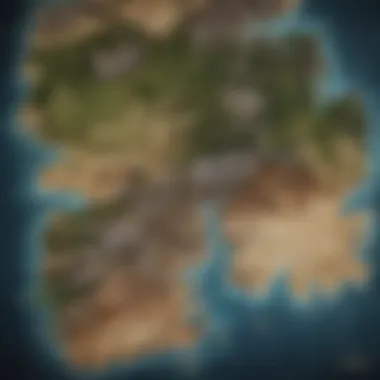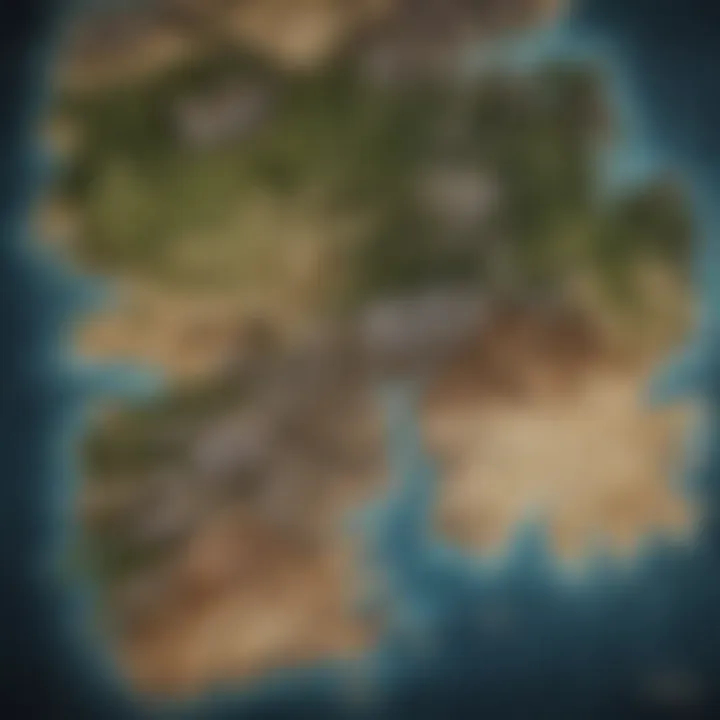The House of Kings: Exploring Westeros' Noble Houses


Intro
The world of Westeros, with its sprawling landscapes and intricate societal structures, offers a backdrop unlike any other. In this realm, the noble houses serve as more than just names on a family tree; they are the lifeblood of the world, driving plots and shaping destinies. Understanding the dynamics of these houses, dubbed as the 'House of Kings,' can enhance one’s appreciation for the struggles, conflicts, and alliances that dominate the narrative.
In this piece, we aim to peel back the layers of Westeros’ noble houses, diving deep into their histories, significant characters, and the political machinations at play. This exploration will provide valuable insights into how these elements contribute to creating a richly woven tapestry of storytelling.
The discussions to unfold will, through various lenses, highlight the complexities of relationships within the realm. Through character dissections, episode breakdowns, and lore explorations, you will gain a firm grasp on what makes the houses of Westeros, and by extension the series itself, endlessly captivating.
Character Dissections
A closer look at individual characters brings us to the heart of the drama. Within the 'House of Kings,' each character carries weight, not only for personal stories but also for the distinct houses they represent. For example, take Eddard Stark—his rise and fall encapsulates the very essence of honor and betrayal in a land where morality is often twisted.
Detailed Analysis of Key Characters
- Eddard Stark: Portrayed by Sean Bean, his steadfast sense of honor brought him to the capital, but it also led to his tragic downfall. Eddard's internal conflict between duty and family sets the tone for the Stark legacy.
- Daenerys Targaryen: From the timid girl sold into marriage to the fiery queen of dragons, her transformation is striking. Daenerys embodies themes of power, vengeance, and redemption, deeply exploring the nuances of leadership and her family's bloody past.
- Tyrion Lannister: Often underestimated, Tyrion's cunning and political savvy allow him to maneuver through the treacherous waters of court politics. His character arc reveals the complexities of being an outsider in one's own family while displaying the fight for importance in the larger narrative.
Character Development Throughout the Series
Character development in Game of Thrones is not a straightforward journey; it is riddled with twists and turns. Characters evolve based on their experiences, revealing the multi-dimensional nature of their personalities. For instance, Sansa Stark's transformation from a naive girl to a politically astute player paints a picture of resilience.
- One key aspect to note is how betrayal shapes the characters. Each act of treachery leaves an indelible mark, pushing characters towards extremes.
Impact on the Overarching Storyline
The actions of these pivotal characters resonate throughout Westeros, affecting not just their fates but also those of their families and, in many cases, the very fabric of the realm. The interplay between Eddard’s honor and the ruthless ambition of Cersei Lannister demonstrates how personal values can clash violently with the realities of power.
"When the snows fall and the white winds blow, the lone wolf dies but the pack survives." - Eddard Stark
This insight underscores the importance of alliances, family, and the sacrifices made in a cutthroat environment.
Episode Breakdowns
To appreciate the full scope of these characters and their houses, one must examine significant episodes that illustrate pivotal moments in the series. Each episode often acts as a microcosm of larger themes—betrayal, loyalty, and the quest for power play out under a grander narrative arc.
Lore Explorations
Westeros is steeped in history, with tales of past events shaping the present. The lore surrounding the noble houses provides context that enriches the viewer’s understanding of their motivations and decisions. Having knowledge of events like Robert’s Rebellion or the Dance of Dragons can significantly deepen one's appreciation of character dynamics.
Fan Theories
Finally, the fan base surrounding Game of Thrones brings alive a multitude of theories. Each theory, rooted in either the show's universe or its source material, invites engaging discussions on potential plot twists and conclusions. By analyzing these theories, fans not only find community but also engage with the intricacies of the narrative on a deeper level.
Through this deep dive into the realms of Westeros, we hope to illuminate the complex tapestry that is the 'House of Kings,' fostering a greater appreciation for the art of storytelling in one of the most popular series of our time.
Prelims to the Noble Houses of Westeros
Westeros is a land where allegiances shift like quicksand, where the game of thrones hundreds can lead to life, death, or worse. The noble houses play a crucial role in shaping the political landscape, influencing everything from battles to marriages, and even the disposition of the Iron Throne itself. They embody the essence of ambition, loyalty, betrayal, and honor, with each house bringing its unique flavor to the ongoing saga. As we unwind the complex history woven through the tapestry of these illustrious families, we shed light on how their actions have forged the destiny of the realm.
Understanding the intricacies of these noble houses not only enriches one's appreciation for the narrative but also reveals the subtle undercurrents that drive characters toward their fates. The ambitions of a house can lead allies to support it or enemies to bring it down, illustrating the delicate balance of power in Westeros. In this section, we will explore the fundamental role of these houses, laying the groundwork for what follows.
The Role of Houses in Westeros
The noble houses serve as the bedrock of Westerosi society, functioning as both political entities and symbols of cultural identity. Each house boasts its own sigil, motto, and history, creating a striking visual and thematic representation of their ideals and ambitions. These elements are not mere embellishments—they are strategic tools in a broader game of influence and authority.
- Political Alliances: Houses often forge alliances through marriages, creating webs of loyalty and obligation. Such unions can shift power dynamics dramatically, as seen with House Stark and House Lannister.
- Military Support: When a house calls its bannermen for war, the commitment is both a show of loyalty and a necessity for survival. Whether it’s the Greyjoys raiding the coast or the Tyrells' help during critical battles, the military prowess of houses can prove decisive.
- Cultural Identity: Each house also serves as a vessel for the values and traditions of its region. The Starks prize honor and loyalty, while the Lannisters uphold wealth and ambition. These cultural markers impact character behavior and choices throughout the series.
A Brief Overview of Key Houses
To understand the complex dynamics at play, we should take a brief look at some of the major houses that populate this narrative landscape. These families are not just players on a chessboard; they embody the heartbeat of Westeros, each with its own unique philosophies and histories.
- House Stark: Renowned for their honor and deep-rooted loyalty, the Starks are the North's protectors. Their motto, "Winter is Coming," is a testament to their vigilance and readiness against inevitable hardships.
- House Lannister: Often regarded as the wealthiest family in Westeros, the Lannisters wield their gold as effectively as their wit.\nTheir motto, "Hear Me Roar!" embodies their thirst for power and dominance.
- House Targaryen: Known as the dragonlords, the Targaryens are steeped in a legacy of fire and blood. Spanning centuries, their quest for power often centers around dragons, symbolizing destruction and regality in equal measure.
- House Baratheon: With roots in rebellion, the Baratheons claim the Iron Throne and aim to reinforce their rule through strength, loyalty, and their distinct symbolism of the stag.
- House Martell: Hailing from Dorne, the Martells bring a unique flair and cunning, emphasizing strategy and subtlety in their political maneuvers, setting them apart from other houses.
As we navigate through this vast ocean of political intrigue, understanding the foundations of these noble houses provides essential context, unraveling how they influence not just individual fates, but the very fate of Westeros itself.
The Targaryens: The House of Fire and Blood
The Targaryens hold a significant place within the realms of Westeros, representing both the height of noble power and the depths of tragedy. When discussing the dynamics of noble houses, their unique history marked by fire and blood stands out, infusing both intrigue and caution in the political landscape. This house, with its iconic dragons and fluctuating fortunes, serves as an embodiment of how power can both elevate and devastate. Their legacy not only affects their direct descendants but also shapes the very fabric of Westeros, leaving echoes found in every alliance and betrayal.
Foundations of Power
House Targaryen's rise to power is steeped in legendary tales, from their Valyrian roots to their eventual conquest of Westeros led by Aegon the Conqueror. The Targaryens were originally one of the noble families in Valyria, a land known for its sorcery and dragon-riding. Fleeing the doom that engulfed Valyria, Aegon and his sisters landed on Dragonstone, establishing their claim over Westeros. It wasn't just their dragons but also Aegon’s strategic acumen that laid the groundwork for their dominion. By forging alliances and understanding the weaknesses of rival houses, they built a powerful dynasty that stretched across the seven kingdoms.
Key Elements in Their Foundation:
- Dragons: Their most formidable assets, dragons were not merely weapons of war. They symbolized the Targaryen birthright and authority.
- Marriage Alliances: The Targaryens often intermarried with other noble families, a practice aimed at solidifying their power and keeping bloodlines pure.
- Strong Leadership: Figures like Aegon the Conqueror and his descendants displayed a blend of ruthlessness and diplomacy.
This combination set a powerful precedent, allowing them to dominate power struggles and shape the political landscape.


Key Figures in Targaryen History
Throughout their storied existence, several Targaryens have risen to prominence, each contributing to the house’s legacy in distinct ways.
- Aegon I (Aegon the Conqueror): The founder of the Targaryen dynasty in Westeros, he unified the seven kingdoms through a combination of military might and clever diplomacy.
- Daenerys Targaryen: Often referred to as Daenerys Stormborn, her journey from exile to claiming the Iron Throne demonstrates resilience in the face of adversity, embodying the flames of the Targaryen spirit and the complexities of family loyalty.
- Viserys Targaryen: Daenerys's brother, whose pursuit of power showcases a more desperate and often misguided interpretation of Targaryen legacy, highlighting the house's downfall.
"When the snows fall and the white winds blow, the lone wolf dies, but the pack survives.”
This quote contextualizes Targaryen politics, where strength in family ties remains imperative.
The Impact of Dragons on Politics
Dragons, often regarded as living weapons, shifted the balance of power so significantly that few could resist their flame. The presence of dragons influenced not just warfare but also the very essence of Targaryen rule. When Aegon the Conqueror rode his dragon, Balerion the Black Dread, his enemies realized that conventional tactics would barely scratch the surface against such overwhelming force.
- Psychological Warfare: The fear invoked by the mere sight of dragons effectively deterred uprisings; rebel leaders studied the skies as much as they did the battlefield.
- Territory Control: Armed with dragons, House Targaryen fortified their rule over key territories, instilling a long-lasting reverence and terror in the hearts of their subjects.
- Political Manipulation: The Targaryens understood that alliances and power structures could easily be swayed simply by the display of a dragon, often sealing deals or coiling political conversations.
Thus, the Dracarys legacy was not merely one of destruction but was intertwined with governance, shaping the course of Westerosi politics for generations to come.
The Starks: Guardians of the North
The Stark family, ruling from their ancestral seat of Winterfell, stands as a symbol of resilience and strength in the harsh realm of the North. They are often viewed as the moral compass in the turbulent tale of Westeros, embodying values that are oftentimes at odds with the cutthroat politics of other noble houses. Understanding the significance of the Starks within the fabric of the House of Kings allows readers to grasp how their principles influence the northern territories and beyond.
Values and Principles of the Stark Family
The Stark family is founded on the bedrock of honor, duty, and loyalty. These values, succinctly encapsulated in their cherished motto, "Winter is Coming," serve as a constant reminder of the harsh realities of life in the North and the necessity of preparation and vigilance. The Starks see themselves as guardians, not just of their own lands but of the realm's broader ideals of justice and integrity.
- Honor is paramount. Unlike many of their counterparts, the Starks uphold principles that preclude betrayal and deception, earning them respect—a quality that often sets them apart, even if it sometimes leads to their downfall.
- Loyalty is another crucial pillar. Starks regard their allegiance to family and friends as unbreakable bonds. This is evident in how they defend their kin and stand by their sworn oaths.
- Duty to the Realm is intrinsic to their identity. Whether it be confronting threats from beyond the Wall or navigating the treacherous waters of Southern politics, Starks believe in their responsibility to protect their people and uphold the North’s interests.
Major Events in Stark History
Stark history is sprinkled with both triumph and tragedy, illuminating the unwavering commitment of the family to the North. A few key events constantly ripple through conversations among fans:
- The War of the Five Kings: A decisive moment that dramatically altered their fate. War erupted over the Iron Throne, forcing the Starks into a series of conflicts that would cost them dearly.
- The Red Wedding: Perhaps the defining calamity in Stark history, this event showcased the brutal realities of ambition and betrayal. The Starks' massacre at the wedding left a bitter mark on their legacy.
- Ned Stark's Execution: Eddard Stark’s execution marked a grim turning point for the family. It catalyzed a brutal cycle of revenge and retaliation, demonstrating the harsh implications of choices made in the political arena.
Each of these events not only shaped the Starks but also illustrated the core values they stand for—sacrificing personal desires for the well-being of their family and the North.
The Importance of Honor and Loyalty
In a world where alliances are often shifty and betrayal is but a dagger’s throw away, the emphasis on honor and loyalty becomes particularly salient. The Starks refuse to compromise these traits, serving as a bulwark against the moral vacuity that can characterize westerosi politics.
- Honor in Stark dealings lays a foundation for their interactions with other houses. They face challenges, yet remain steadfast in their truthfulness, which, regardless of outcomes, garners them respect from some and fear from others.
- Loyalty is displayed relentlessly within the family. Even amidst dire consequences, the Starks remain committed to each other. This leather-tough loyalty becomes an anchor during times of strife.
"The things I do for love" - An often-repeated sentiment, reminding us that loyalty sometimes demands the heaviest sacrifices.
The Lannisters: The Wealthiest Family in Westeros
House Lannister stands as a titan in the realm of Westeros, often described through the lens of wealth and cunning. Their fame—or rather infamy—arises from a blend of vast riches, strategic manipulation, and their pivotal role in the political theater of the Seven Kingdoms. Lannisters are synonymous with gold, not just because of their coffers overflowing with treasure, but also due to their famous saying: "Hear Me Roar!" Their ability to wield influence far surpasses mere financial power; it intertwines with family legacies, vendettas, and the thirst for dominance.
The Origins of Lannister Wealth
The roots of Lannister wealth can be traced back to their ancestral seat, Casterly Rock. Nestled precariously on the coast of the Sunset Sea, Casterly Rock is more than just a castle; it symbolizes the secrets held within its towering walls and the riches buried beneath its rocky foundations. Legend has it that the Lannisters are descended from the legendary giant Lann the Clever, who outwitted the previous inhabitants, the Casterlys, to claim the land.
Gold mining has been the cornerstone of their prosperity. The vast mines that once flourished under their control are often likened to veins of gold running through the rock itself. The phrase “A Lannister always pays his debts” is more than a mere statement—it represents their ability to leverage financial power for political gain. This wealth affords them the means to finance armies, forge alliances, and manipulate events to ensure their lasting legacy.
Influence and Manipulation
With power comes responsibility, but for the Lannisters, it often translates into darker forms of influence. Cunning and ruthless strategies have characterized their rise within the political landscape. While gold is a significant asset, it is their ability to maneuver people and resources that makes them formidable players in the game of thrones.
- Political Alliances: The Lannisters have forged strategic marriages, aligning themselves with powerful houses to further their influence. The union between Cersei Lannister and King Robert Baratheon is a prime example, allowing them to sit at the royal table.
- Coercive Tactics: Tyrion Lannister, despite his often underappreciated intelligence, demonstrates the power of persuasion. He uses both wit and wealth to navigate troubling waters.
- Manipulating Information: The Lannisters are often accused of controlling narratives. Rumors spread through their machinations can sway loyalties and shift the balance of power, leaving their enemies in a disarray that opens opportunities.
Key Characters in Lannister Lore
Every house in Westeros is defined by its characters, and the Lannisters are no exception. The personalities within this wealthy family embody their complex moral landscapes and varying ambitions.
- Tywin Lannister: The patriarch whose iron fist governs the family fortune. His strategic acumen and mercilessness lay the groundwork for the family's political prowess.
- Cersei Lannister: Ambitious and driven, her desire for power transcends family loyalty, resulting in machinations that shake the very foundations of power.
- Tyrion Lannister: Often underestimated, he uses wit and intellect to navigate his family's treacherous waters, seeking to establish his own identity outside of his family's shadow.
- Jaime Lannister: Known as the Kingslayer, his actions shape not only his fate but also the moral dilemmas faced by those around him, drawing the line between honor and dishonor.
"The things I do for love."
This memorable quote from Jaime encapsulates the Lannisters' family dynamic—it’s a blend of loyalty, manipulation, and moral conflict embedded within their rule.
The Lannisters, in many ways, are the embodiment of wealth as both a weapon and a tool. They navigate the intricate dance of power, often leaving calamity in their wake while securing their position atop the House of Kings in Westeros.
The Baratheons: Claimants to the Iron Throne
House Baratheon holds a significant place in the lore of Westeros, standing tall as claimants to the Iron Throne. Their prominence emerges not just from their royal ties but from the sheer force of character and ambition that defined their lineage. The Baratheons, fierce and unpredictable, embody the volatile nature of their house emblem, the crowned stag. This section delves into the elements that made House Baratheon a powerhouse, exploring their rise and enduring legacy.
The Rise of House Baratheon
The roots of House Baratheon can be traced back to the turbulent times preceding the Targaryen conquest. They began as a minor house, but the tides turned when Orys Baratheon, the half-brother of Aegon I Targaryen, helped in the conquest of Westeros. Orys earned his place through valor and loyalty, being awarded Storm's End— a stronghold symbolic of their future prominence.


In those early days, the Baratheons showcased their martial prowess. Their ambition led them to seize opportunities that would elevate their standing. As the Targaryen dynasty faced challenges, House Baratheon's ambitions turned into action. Their declaration for independence in the wake of King Aerys II’s madness marked a turning point. They were no longer mere participants in the game of thrones; they were players that mattered.
True power came with the crowning of Robert Baratheon, who ascended the throne after leading the rebellion that toppled the Targaryens. His claim to the throne came not only from blood but also from the fervor of the people and the political alliances he forged through both friendship and warfare.
The Legacy of Robert Baratheon
Robert Baratheon’s reign, however chaotic, carved an indelible mark in the annals of Westerosi history. His robust physique, along with his boisterous personality, painted a classic image of a king, but his legacy is much more complex than a mere warrior ruler. His rise not only shattered the Targaryen dominion but also set in motion a series of events that changed the political landscape forever.
Under Robert’s rule, the kingdom witnessed a blend of excess and prosperity, but these were always laced with the tensions of his earlier life. His serious drinking and lavish lifestyle often obscured the underlying problems facing the realm. The Westerlands became a cauldron of intrigue as noblemen grappled for favor and position while trying to navigate the consequences of Robert's often reckless decisions.
Despite polarizing views on his capabilities as a monarch, Robert Baratheon’s legacy paved the way for his children—Joffrey, Myrcella, and Tommen—each wrestling with their inherited crown against a backdrop of chaos. The Baratheon claim remained strong, but it was riddled with vulnerabilities, exposing the fragility of power amidst family betrayal and political strife.
"A man who fights for his own, fights the hardest."
This sentiment resonates profoundly within the Baratheon lineage, reminding us that the thirst for power often leads to devastation both for the realm and the houses that seek it. In essence, the legacy of Robert Baratheon is not just about his rule but stands as a cautionary tale of ambition unchecked by wisdom—a narrative that rings through the hearts of those who bear the Baratheon name today, echoing in the timeless story of Westeros.
The Greyjoys: Lords of the Iron Islands
The Greyjoys hold a unique position in the intricate tapestry of Westeros' noble houses. Known for their seafaring prowess and fierce independence, the Ironborn, as they are often called, embody the ruggedness of their island home. Unlike other noble houses who may bide their time in political councils or courtly games, the Greyjoys have a mentality shaped by the sea and the relentless winds of the Iron Islands. Their motto, "We Do Not Sow," encapsulates a philosophy that places emphasis on raiding and reclaiming rather than merely cultivating the land. This ideology not only influences their approach to power but also shapes their reputation across Westeros.
The importance of the Greyjoys cannot be overstated. As lords of the Iron Islands, they have always represented a rebellious spirit that challenges the status quo. Their very existence in the realm raises questions about loyalty, power, and the intricacies of leadership. Each Greyjoy leader, with their own ambitions and peculiarities, adds depth to the narrative surrounding the Iron Islands, reminding readers that the realms of Westeros are as diverse as they are interwoven.
The Supporting Role of Seafaring in Politics
Seafaring is the lifeblood of the Iron Islands’ culture and policy. For the Greyjoys, the horizon is more than a view; it is an opportunity. Control over the seas translates to power, and the Greyjoys have mastered this art. Their longships, designed for fast and unexpected attacks, symbolize their inclination towards aggression. When they sail the waters around Westeros, they aren’t just traveling; they are staking their claim over trade routes and fishing grounds.
- Naval Strategy: The Ironborn have perfected tactics that allow them to strike quickly and retreat before opposition can mobilize. This unpredictability often catches their enemies off guard, making them formidable in conflicts.
- Economic Impact: The Greyjoys not only raid but also leverage their naval dominance to control the lucrative maritime trade, creating a steady source of wealth from plundered resources.
- Cultural Influence: Their seafaring lifestyle fosters a culture that values strength and resourcefulness over traditional land-based power structures.
The policy implications of seafaring are clear: whoever controls the seas can dictate terms to land-based opponents. This fact often places the Greyjoys in a prominent role in various conflicts, whether they are aligning with or challenging the more traditional houses of Westeros.
Key Greyjoy Figures
Several pivotal figures from House Greyjoy have left an indelible mark on the history of Westeros, embodying the fierce spirit of the Iron Islands.
- Balon Greyjoy: The reaper of the islands, Balon’s desire for independence from the Iron Throne triggered the Greyjoy Rebellion, which aimed to reclaim the ancestral lands and authority. His leadership showcased the Ironborn’s unwillingness to be subjugated by mainland politics.
- Theon Greyjoy: Often seen as the tragic figure of the Greyjoy line, Theon’s storyline reflects the conflict between identity and allegiance. His complicated relationship with the Starks, who raised him like a son, and his eventual return to the Iron Islands, depict the struggle for acceptance and loyalty.
- Yara Greyjoy (Asha in the books): As the daughter of Balon, Yara has shown exceptional capability in leadership and combat, challenging gender norms in her society. Her fierce loyalty to her family and her skills in strategy mark her as a rising star among the Greyjoys.
"We are Ironborn, and we do not sow. We take what is ours!"
This ethos echoed by the Greyjoys permeates their saga, influencing both their internal family dynamics and their interactions with other houses. Through their stories, we see the themes of rebellion, identity, and the stark realities of a life at sea woven into the larger narrative of Westeros.
The Tyrells: The Flower of Highgarden
The Tyrells embody a blend of delicate beauty and resilient power in Westeros. Known as The Flower of Highgarden, they are pivotal to understanding the dynamics of political maneuvering within the realm. Their home, Highgarden, renowned for its lush gardens and bountiful harvests, symbolizes both their wealth and strategic prowess. This house is not just another family among the noble factions; they are deeply intertwined in the complex web of alliances and enmities that characterize the struggle for power. The Tyrells stand out as significant players, weaving their way through the intricate politics of the Seven Kingdoms, often at the center of pivotal events.
Wealth and Strategy in the Reach
The Reach, a fertile and prosperous region, serves as the backbone of House Tyrell’s influence. The Tyrells’ wealth stems from their ability to harness the land's agricultural bounty. Their control over food supplies gives them considerable leverage in negotiations and alliances. When times get tough, gold grows from golden grains.
- Agricultural Prosperity: The vast fields of the Reach produce not just food, but also resources like wine and herbs, which are critical both for trade and as gifts to win favor among other houses.
- Financial Acumen: The Tyrells understand that money makes the world go round. They invest wisely in various ventures, securing their position as key financial backers in Westeros. This enables them to maintain an army that can rival even the likes of the Lannisters.
- Influence through Marriage: Marital ties bolster their political foothold. The union of Margaery Tyrell and King Joffrey Baratheon exemplifies how they seek to leverage romantic alliances to extend their power.
Their knack for strategy is not just limited to land and marriage, but they also excel in high-stakes political games. For example, during the War of the Five Kings, the Tyrells played a crucial role in shifting tides, often supporting the stronger houses when it benefited them while quietly planning their further rise.
Political Alliances and Betrayals
House Tyrell's history is steeped in intrigue, marked by alliances that are as fragile as the flowers their sigil represents. Their motto, "Growing Strong," reflects the family’s capacity to adapt and thrive regardless of the challenges faced.
- Strategic Partnerships: Forming alliances is second nature to the Tyrells. Their union with the Lannisters through marriage was primarily a strategic move. Allies today can easily become enemies tomorrow, making their back-and-forth dance with loyalty a key element of their political strategy.
- Calculated Betrayals: Notorious for their political cunning, the Tyrells are also known for their betrayals when it suits them. An example can be found in the aftermath of King Joffrey’s death, where they turned to align themselves with House Martell, shaking hands while keeping swords close.
Their myriad relationships within the turbulent landscape of Westeros highlight their dual nature—both confident bloomers in the garden of politics and thorny adversaries when the situation demands it. The Tyrells exemplify how nurturing connections can lead to both stunning victories and tragic downfalls.
"One flower may bloom, but in the garden of kings, it is the thorns that often leave the deepest scars."
Through their wealth, strategic alliances, and the willingness to play intricate political games, the Tyrells have ensured their place in the annals of Westerosi history, reminding us that even the most delicate flowers can possess a hidden strength.
The Martells: Sunspear’s Ambitions
The Martells hold a distinctive place in the intricate tapestry of Westeros. Known for their unique culture, political strategies, and the powerful symbol of Dorne, they exemplify the essence of regional identity in a realm often marked by patriarchal dominance. Their ambitions, grounded in the sun-soaked sands of Dorne, speak volumes about the complexities of regional power plays within the political landscape of the Seven Kingdoms.
The Distinctiveness of Dorne
Dorne is not just another territory in Westeros; it is a realm that prided itself on its different customs and fierce independence. The Martell family, as its ruling house, embodies these qualities exceptionally well. Unlike the icy North or the thorny politics of the Westerlands, Dorne's climate shapes its people and politics.
The people of Dorne, shaped by Mediterranean influences, celebrate life with a vibrancy that can be felt in their food, music, and attire. Their matriarchal traditions and acceptance of strong women in prominent roles challenge the typically male-dominated structure of other houses. For instance, the notable Oberyn Martell, with his charisma and prowess, reminds everyone of the lethal elegance that Dorne encompasses.
This regional identity plays a significant role in how the Martells approach politics. Grounded in a mix of diplomacy and tactical strikes, they aim to secure their position while often opting for alliances that might seem unconventional to those from other regions. Rather than simply waging war or seeking dominance, they prefer to weave their influence into the fabric of destinies across Westeros.
Martell Strategies and Conflict


The Martells are not just known for their rich culture but also for their cunning strategies and handling of conflict. Their approach often diverges from the typical Westerosi playbook. For one, they are not averse to employing subterfuge or clever machinations to outsmart their foes.
Having faced numerous challenges over the years, particularly during the War of the Five Kings, Martell strategies have evolved. They have often emphasized alliances through marriages and treaties rather than brute force. The dissension after the death of Oberyn Martell sparked the need for a careful calculation of allegiances.
Here are key elements of Martell strategies:
- Calculated Alliances: Tying bonds through strategic marriages, like that of Myrcella Baratheon to a Martell.
- Information Warfare: The Martells are skilled in the art of gathering information, knowing when to strike and when to play the long game.
- Public Personas: By maintaining a vibrant and hospitable public image, they lull their rivals into underestimating their capabilities.
"In Dorne, we fight with blades of sun and steel."
This quote sums up their ethos perfectly; a Martells' way of combat is nuanced and often dictated by the laws of the desert, rather than the cold strategies of their northern counterparts. The mantra of the Martells reflects their ambition—not merely to survive in this harsh world but to thrive on their own terms, advocating for honor and justice across the sands of time.
Overall, the Martells bring an intriguing angle to the larger narrative of the noble houses in Westeros. Their distinctive culture, coupled with a crafty approach to politics, firmly establishes them as a formidable force in the realms of intrigue and ambition.
The Arryns: The Vale's Influence
The Arryns, though not always in the spotlight, hold a crucial position within the tapestry of Westeros. Nestled in the Vale, their influence resonates throughout the realm, echoing through the events that shape the political landscape. Each action taken by the Arryns has rippling effects, making them an important player in the broader narrative of power and intrigue. They embody the complexities of noble lineage, often marked by a mix of ambition and restraint, a duality that often defines noble houses in Westeros.
Aerial Advantage: Geography and Politics
Perched high atop the Mountains of the Moon, the Vale is more than just a pretty backdrop. It's a natural fortress that gives the Arryns a strategic position that is hard to rival. This aerial advantage is significant, allowing them to monitor movements of friend and foe alike with ease. The unique terrain restricts access, creating a buffer that protects their stronghold, the Eyrie, which is known for its lofty heights and impregnable walls.
- Challenging Access: The winding paths leading to the Eyrie mean that any army approaching would face significant obstacles, both natural and man-made. This factor allows the Arryns to rely on defense rather than seeking out offensive battles.
- Political Leverage: The isolated setting often grants the Arryns the perceived role of mediators among the warring houses. When tensions rise, their ability to keep a neutral stance gives them an unexpected power.
- Natural Resources: The Vale is not just a stronghold; it also has fertile lands. These resources add to their wealth, allowing them to support their armies and engage in political maneuvers without the immediate need for external allies.
This geographical mastery shapes their political interactions. In a world where houses constantly vie for supremacy, it’s their unique position in the Vale that often allows them to maintain a lower profile while still manipulating events behind the scenes.
The Last of House Arryn
The phrase "the last of House Arryn" isn’t merely a label; it carries with it a weight of historical significance and emotional resonance. As the last scion, the current head bears a mantle that connects the past to the present, a role fraught with challenges and expectations.
House Arryn's narrative threads back to the days of the Targaryens, where they played pivotal roles as the Wardens of the East. However, their current existence seems tattered, a house that struggles to maintain its relevance in a shifting landscape.
- Leadership Challenges: The current leader of House Arryn has the difficult task of safeguarding both the legacy of his forebears and the future of his house. Decisions made now may either solidify their status or lead to their gradual downfall.
- Politically Isolated: The Vale's relative seclusion means that the Arryns often find themselves in an isolated bubble, removed from the central power struggles that engulf the other houses. This isolation can be both a blessing and a curse; while they can avoid many conflicts, it also means they risk being forgotten in the broader power dynamics.
- Striving for Influence: Engaging in alliances, the last of House Arryn must navigate a treacherous web of loyalties, often relying on the characters and stories that dwell in their rich history. Their legacy is potentially an anchor that could guide their political maneuvers, but it also serves as a constant reminder of what once was.
"As the last of House Arryn, every choice comes with the shadow of the past, a history rich but burdening, shaping the path towards an uncertain future."
In summary, while House Arryn may not always be the most vocal in political conversations, their history, geography, and the current state of their legacy keep them relevant, threading their narrative into the broader saga of Westeros. Understanding the Vale and the Arryns uncovers a deeper layer of the political and social dynamics, showcasing how even the quietest houses can influence the tides of change.
The Ironborn: A Legacy of Rebellion
The Ironborn represent a unique and multifaceted chapter in the narrative of Westeros, rooted in a culture that thrives on rebellion and independence. Their rugged existence on the Iron Islands has crafted an identity steeped in maritime tradition and a fierce sense of autonomy that often places them at odds with the mainland. This section explores the intricate dynamics of Ironborn culture and beliefs, as well as the significant leaders who have helped shape their storied legacy.
Ironborn Culture and Beliefs
The essence of Ironborn culture can be traced back to the ancient mantra: "We Do Not Sow." This principle embodies their rejection of farming and agriculture, emphasizing instead their identity as raiders and seafarers. The Iron Islands, with their harsh landscapes, have influenced their cultural norms, breeding a people who value strength and survival over the softness of traditional land-based societies.
- Raiding Heritage: The Ironborn take pride in their deeds on the sea. Raiding is not just a way of life but a rite of passage. The phrase "A man who does not raid is already dead" reflects their deep-seated belief in the glory of battle and conquering. Ironborn view the spoils of warfare as a testament to their prowess, and it defines their social status among peers.
- Religion of the Drowned God: Ironborn worship the Drowned God, an embodiment of the sea's wrath and unpredictability. Rituals often involve drowning as a means to rebirth. The strong belief in a divinity that favors the bold cements their audacity and bravery, pushing them to embrace their nature as ruthless warriors.
- Hierarchy and Kingship: The Iron Islands function under a feudalistic structure, yet their societal hierarchy is fluid. The ruling lords gather under the banner of what they call the Kingsmoot—a unique assembly where any eligible Ironborn can claim kingship through a show of strength and support from the others. This reflects their belief that leadership should merit from action rather than birthright.
Leaders and Their Impact on History
Throughout history, several leaders have emerged from the Ironborn, each leaving a significant imprint on their legacy. From fierce warlords to cunning tacticians, these figures embody the fervor of their people and often pull the strings of fate in Westeros.
- Balon Greyjoy: The head of House Greyjoy and a pivotal figure during the War of the Five Kings. Balon sought to assert the sovereignty of the Iron Islands by declaring himself king. His leadership sparked attempts to reclaim old glories through conflict, showcasing the ambition deeply rooted within Ironborn culture.
- Euron Greyjoy: Another ambitious leader, Euron's rise to power was marked by cunning and ruthlessness. His disregard for tradition and desire for dominance led him to wage war across the seas, challenging not only his enemies but also the core values of Ironborn society itself. His actions pushed the Ironborn into a more aggressive role on the world stage, altering relationships with other houses for better or worse.
- Victarion Greyjoy: As a steadfast warrior and loyal brother to Balon, Victarion’s contributions to Ironborn raids are often overlooked. He embodies the rugged determination of the Ironborn and serves as a reminder that there exists a vast reservoir of loyalty within their ranks, even amidst shifting tides of rebellion and ambition.
"The sea is a cruel mistress, but she rewards those bold enough to embrace her."
In understanding the Ironborn, one must appreciate not just their rebellious legacy, but also the values that bind their culture together. Their unwavering resolve and unique governance structure showcase a distinct perspective within the broader tapestry of Westerosi politics. This legacy of rebellion shapes their interactions and conflicts with the other houses, establishing the Ironborn as critical players in the game for power.
Culmination: The Interwoven Fates of Houses
The noble houses of Westeros form a complex tapestry of relationships that influence the realm's politics and culture. Their fates are not isolated; instead, they are interlaid with one another, shaped by alliances, betrayals, and the ever-looming shadow of power struggles. The concluding remarks on these houses provide clarity on how interconnected their destinies are and highlight the consequences of their actions.
In exploring these fates, one can discern the fundamental laws of history wherein alliances are made, broken, and reformed. It's essential to recognize how each house contributes to the broader narrative—sometimes it’s through direct confrontation, while, at other times, it’s through quiet machinations behind closed doors. Understanding this intricate dynamic is crucial because it adds depth to the overarching story, showcasing that when one house rises, another often falls.
"The fate of one house does not rest alone; it is a thread in the fabric of many."
The repercussions of these interwoven relations manifest in various ways—land lost or gained, oaths kept or broken—ultimately determining the balance of power. Recognizing this interdependence can deepen one’s appreciation for the strategic gameplay at work.
The Lasting Legacy of the Houses
The houses of Westeros each carry a legacy that transcends their immediate circumstances. Take the Targaryens, who with their dragons forged an empire that united disparate kingdoms. Their legacy, fraught with tragedy and ambition, highlights the notion that power often comes at a grave personal cost. Likewise, the Starks, known for their honor, represent a different facet of legacy—one steeped in loyalty but also marred by vengeance and loss.
- Targaryens: Fire and blood, symbolizing both destruction and rebirth.
- Starks: The old adage, "The north remembers," suggests a legacy of resilience and justice.
- Lannisters: Their golden coin is a symbol of wealth, but their legacy often reflects corruption and manipulation, serving as a cautionary tale.
Each house contributes to the mythology of Westeros, where history is not merely a record of events but a living entity influencing current affairs.
Lessons Learned from House Politics
The political landscape in Westeros serves numerous lessons for anyone with an interest in governance or leadership.
- The Importance of Alliances: The strength of a house often hinges on its ability to forge alliances. These connections can provide necessary military strength and political leverage.
- Consequences of Betrayal: Trust is a fragile ornament; breaking it can have dire repercussions, as seen in the downfall of many prominent families.
- The Power of Narrative: The stories told about a house shape its legacy, more so than deeds on a battlefield. Crafting a favorable narrative can be just as powerful as winning wars.
- Resilience in Adversity: Houses like the Martells often demonstrate that adversity can foster resolve. Their unique strategies in conflicts prove that persistence can yield unexpected results.
Through the lens of Westeros, one finds reflections of real-world power dynamics, transformable lessons blending history and fiction, making the narratives even more relevant today.
Understanding these fates and the legacies carried by each house provides deeper insights into the narrative arcs of their stories, enriching the experience of the intricate world George R. R. Martin created.



